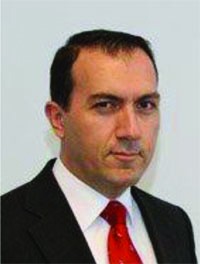Turkey consul general opens dialogue at GVSU

Courtesy Photo / csuohio.edu
Oct 10, 2012
Grand Valley State University will host Fatih Yildiz, the consul general of Turkey for Chicago, Thursday to address Turkey’s role in the Middle East, the world and U.S. operations.
Chad Lingwood, associate professor of history who arranged the visit, said he chose a diplomat from Turkey because the country has emerged as a major participant in Middle Eastern politics over the years. Turkey has been diplomatically involved in the Arab Spring, tension over the Iranian nuclear program, the Israeli-Palestinian affair and the civil war in Syria.
“So, from the perspective of international diplomacy, and the apparent balancing act Turkey is trying to perform—one encapsulated in its so-called ‘no problems with neighbors’ slogan—it is one of the world’s most fascinating countries,” Lingwood said, adding that it is also a very important country. “It is a U.S. ally and member of NATO; it participates in many European economic and security organizations; and being a Muslim country, albeit one with a strong tradition of secularism, it is a significant voice on issues affecting Muslims in the Middle East and around the world.”
Lingwood said he is not sure what Yildiz will discuss, but thinks he will touch on the mediating role Turkey tries to maintain in the Middle East and possibly on the Israeli-Palestinian situation. Lingwood said he hopes Yildiz mentions the growing tensions between the U.S. and Iran over Iran’s nuclear program.
“Turkey, in recent years, has put forth proposals in an effort to get the U.S. and the Iranians to engage in talks and thus ease their mutual suspicions, so it would be interesting to hear him talk about this,” Lingwood said.
Yildiz is also expected to touch on the relationship between the U.S. and Turkey, which hosted U.S. nuclear missiles during part of the Cold War and continues to house an important U.S. air base. Lingwood said Turkey also has positive relations with U.S. tourists and businesses.
“Turkey has been an ally of the U.S. for decades and continues to work in partnership with the U.S. on a whole host of issues,” Lingwood said, but added that the U.S. and Turkey’s diplomatic ties have been strained due to American involvement in Iraq and its “relatively cool relations with Israel.”
Otgonbaatar Bayarmagnai, an international student from Mongolia, studied in Turkey for four years and said his university had no bias toward Americans, but its people didn’t always reflect positively on the U.S.
“As an international student living and studying in Turkey, my observation of Turkish people’s general attitudes toward the United States is somewhat interesting,” Bayarmagnai said. “Turks are very friendly and welcoming (toward) people and I don’t see any particular attitude toward Americans, but (more toward) America. People see the United States as having mainly negative influence.”
Regardless of the reputation of the U.S., GVSU’s reception of Yildiz will do nothing to hinder positive dialogue between the nations.
“I imagine students and faculty will get a greater sense of why Turkey matters in the world, especially in the context of just how interconnected and rapidly changing the world has become,” Lingwood said. “Stated a bit differently, because of Turkey’s unique blend of tradition and modernism, along with its unique geography—with one foot in Europe, the other in Asia—students will gain new insight into a country that has many very intriguing dimensions to it.”
[email protected]

























